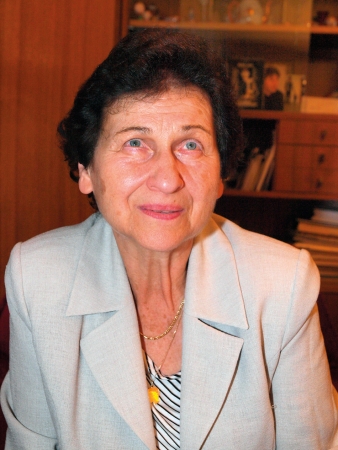
Music is a Faithful Friend
Every year a group of women, who cannot go unnoticed, meet in Špindlerův Mlýn in the autumn. Although 40 years have passed since their fi rst meeting after the war, you will recognise them immediately thanks to their immense love of life. It is Friday Sep. 18, 2009 and Jews all over the world are celebrating Rosh Hashanah – the New Year 5770. And just who are these women? We were given the answer by one of them – Anna Flachová-Hanusová.
Anna was born on Nov. 26, 1930, as the last child of Leo Flach and Alžběta Koberová in Polský Těšín. When she was 1 year old, the family moved to Český Těšín, then to Ostrava and in 1937 to Brno. Anna started to play the piano and attended a ballet school with her sister Alice. After completing secondary school her brother Michal (1938) moved to Prague and began his studies at Charles University. Although he was granted a scholarship to study in America, the Nazi occupation changed everything. Only his sister Irena managed to leave the Protectorate in 1940, by illegal transport to Palestine, on the ship Patria. However, the English did not allow it to enter the country, a bomb planted on the ship exploded and Irena as one of only a few survived the tragedy. She married, fi rst lived in Palestine and later in Australia.
On Anna’s 11th birthday (Nov 26, 1941) an order for transportation to a concentration camp arrived. Three days later the family went to the meeting point, from where they were taken by train, reaching Terezín on Dec. 2. At first Anna lived in the ghetto, together with her parents. After founding children’s homes, she was placed in room 28 of Building L 410. Here Anna and another 2 girls worked in Jad tomechet (Helping Hands) in an attempt to help older people and make their lives a little easier. When Rudolf Freundfeld-Franěk brought the Brundibár opera to the ghetto, she auditioned for it and became a member of the choir. After more than two months of rehearsals the premiere was held in Magdeburg Barracks (Sep. 23, 1943). The girls from room 28 came from various families and backgrounds and it was necessary to fi nd a way to give them certain rules of interpersonal relations. To make life easier for them, the house mothers started playing a game with them which they called Maagal (in Hebrew, a circle). Only such girls who were willing to help the others could enter the circle. Once a month there was an election to see who could enter this circle and the girls considered it a great honour if they were voted into the Maagal.
Anna’s parents stayed in Terezín until the end of the war, but in September 1944 her brother Michal was transported – fi rst to Auschwitz-Birkenau and in October to Buchenwald- Meuselwitz. From here he managed to escape during the Death March and get to the Americans, where he worked as a go-between thanks to his excellent English. His sister Alice was also sent to Auschwitz and then to Bergen- Belsen. Here being seriously ill, she was condemned to death, but was saved by a woman – kapo who remembered how beautifully she had danced at one of the blocks. Although she was later transported from Bergen-Belsen, she kept dancing and surprisingly survived. The war fi nally ended. The Red Cross took over the administration of Terezín. Anna and Ela used to stand for hours on the square listening to announcements on the loud-speaker and believed in their reunion with the family. One day Anna saw something which she really could 67 not believe – her brother Michal in an American uniform.
Anna’s destiny was guided by a concert of Alice Herzová-Sommerová in Terezín. This was also the reason she studied piano and opera signing after the war. She married the musician Vítězslav Hanus, with whom she worked for two years in China, and half a year in Beirut and Australia. As an opera tutor and répétiteur she worked at the Brno Conservatory, was a judge at the international silenced music competition in Schwerin and a teacher of singing and piano accompaniment at master courses in Israel. She has a son Tomáš, also an excellent pianist, daughter-in-law Jana and grandsons Daniel, Tomáš, Michael, Filip and Tobiáš. She lives in Brno, loves life and every year spends a holiday with the “girls from room 28” in Špindlerův Mlýn.
Luděk Sládek
Památník Terezín
Principova alej 304, 411 55 Terezín
Tel.: +420 416 782 225, 416 782 442, 416 782 131
GSM: +420 604 241 179, 606 632 914
E-mail: pamatnik@pamatnik-terezin.cz
www.pamatnik-terezin.cz
Nesouhlas se zpracováním Vašich osobních údajů byl zaznamenán.
Váš záznam bude z databáze Vydavatelstvím KAM po Česku s.r.o. vymazán neprodleně, nejpozději však v zákonné lhůtě.